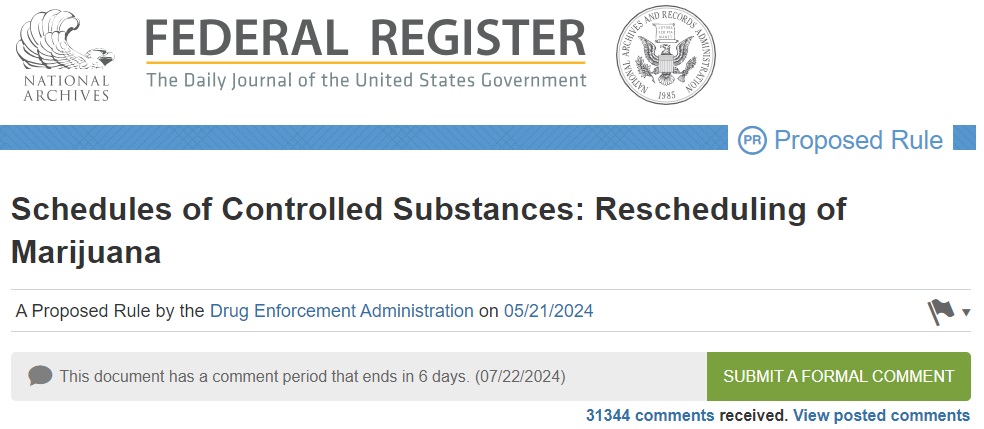In May 2024, the United States Drug Enforcement Administration (DEA) published a proposed rule to reschedule cannabis. Cannabis is currently classified as a Schedule 1 substance at the federal level in the U.S., with the DEA’s proposed rule rescheduling cannabis to Schedule III. The proposal was first announced by U.S. President Joe Biden days before the DEA published the proposed rule.
“The Department of Justice (“DOJ”) proposes to transfer marijuana from schedule I of the Controlled Substances Act (“CSA”) to schedule III of the CSA, consistent with the view of the Department of Health and Human Services (“HHS”) that marijuana has a currently accepted medical use as well as HHS’s views about marijuana’s abuse potential and level of physical or psychological dependence.” the proposed rule states.
As part of the rulemaking process, the federal government has accepted public comments about the proposal to reschedule cannabis. As of the posting of this article, the proposed rule has received over 31,000 public comments:

“The determination by HHS that cannabis use does not possess the same public health burden as does the use of alcohol (unscheduled), tobacco (unscheduled) or other controlled substances currently regulated in lower schedules of the CSA (e.g., benzodiazepines) is consistent with decades of worldwide scientific literature. While HHS ultimately recommends transferring cannabis from Schedule I to Schedule III, NORML wishes to emphasize that these findings similarly provide a factual basis for removing cannabis from the CSA entirely. Although the HHS is not recommending descheduling at this time, NORML asserts that this position is the most appropriate one and that descheduling cannabis should be adopted by future administrations.” the National Organization for Reforming Marijuana Laws (NORML) stated in its public comments.
“If the transfer to schedule III is finalized, the regulatory controls applicable to schedule III controlled substances would apply, as appropriate, along with existing marijuana-specific requirements and any additional controls that might be implemented, including those that might be implemented to meet U.S. treaty obligations.” the proposed rule states on its Federal Register listing.
If marijuana is transferred into schedule III, the manufacture, distribution, dispensing, and possession of marijuana would remain subject to the applicable criminal prohibitions of the CSA. Any drugs containing a substance within the CSA’s definition of “marijuana” would also remain subject to the applicable prohibitions in the Federal Food, Drug, and Cosmetic Act (“FDCA”).” the rule also states. The deadline to submit a public comment is July 22nd, 2024.
The United States adult-use cannabis industry has generated over $20 billion in total tax revenue since the first legal recreational cannabis purchase was made in Colorado on January 1st, 2014 according to a report by the Marijuana Policy Project.
“Through the first quarter of 2024, states have reported a combined total of more than $20 billion in tax revenue from legal, adult-use cannabis sales. In 2023 alone, legalization states generated more than $4 billion in cannabis tax revenue from adult-use sales, which is the most revenue generated by cannabis sales in a single year.” the Marijuana Policy Project stated in a press release.
79% of people living in the United States lived in a county with at least one regulated cannabis dispensary according to an analysis by the Pew Research Center. The Pew Research Center also found the following:
- 74% of people in the U.S. live in a state where recreational or medical cannabis is legal
- There are nearly 15,000 cannabis dispensaries in the U.S.
- California has the most overall dispensaries (3,659)
- Oklahoma has the most dispensaries per capita (36 dispensaries for every 100,000 residents)
Total legal cannabis sales in the United States are expected to reach $31.4 billion in 2024 according to a recent analysis by Whitney Economics. Additionally, leading cannabis jobs platform Vangst, in conjunction with Whitney Economics, estimates that the legal cannabis industry now supports 440,445 full time-equivalent cannabis jobs in the United States.
Whitney Economics also projects the following legal cannabis sales figures in the United States for the coming years:
- 2024: $31.4 billion (9.1% growth from 2023)
- 2025: $35.2 billion (12.1% growth from 2024)
- 2030: $67.2 billion
- 2035: $87.0 billion
The emerging legal cannabis industry in the United States is projected to add roughly $112 billion to the nation’s economy in 2024 according to an analysis by MJBiz Daily. The projection is part of the company’s 2024 MJBiz Factbook.
“The total U.S. economic impact generated by regulated marijuana sales could top $112.4 billion in 2024, about 12% more than last year,” MJBiz stated in its initial reporting.

